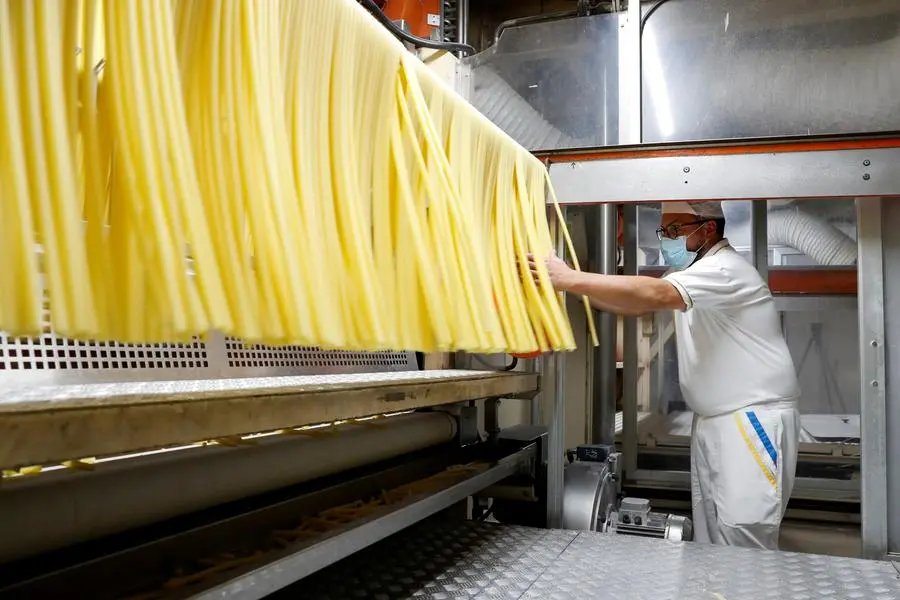PHOTO
PARIS/WINNIPEG, Manitoba - Pasta lovers must brace to pay even higher prices for their favorite dish, as drought in Canada and bad weather in Europe damages crops of durum wheat and reduces supplies available to flour millers and food companies.
Italy's government called a crisis meeting in May as prices for the staple food jumped by more than double the national inflation rate.
With global production of durum wheat headed for a 22-year low, Italy's famed pasta makers have had to turn to unusual suppliers such as Turkey for their main ingredient.
In Toronto, Continental Noodles knew there was trouble when the cost of a 20-kilogram bag of semolina flour, milled from durum, rose 24% in a few weeks of July to C$26 ($19.15).
Family-owned Continental, which sells fettuccine and ravioli to Whole Foods and the general public, is also paying more for tomatoes used in sauce after crop setbacks in Spain and India.
One of Continental's owners, Vincent Liberatore, fears prices will rise even more now that farmers in top durum exporter Canada have seen their harvest devastated by drought. He said the business will absorb the costs as long as possible, uncertain how much more consumers will pay.
"The population has tapped out - everything has been going up," Liberatore said. "The biggest stress for us business owners right now is the unknown - the roller coaster up and down." Retail pasta prices rose about 12% this year in Europe and 8% in the United States, according to market research firm Nielsen. Prices of another staple, rice, have also spiked following export curbs in India.
The International Grains Council forecasts 2023/24 global durum production at a 22-year low, pushing world stocks to their smallest in three decades.
CANADA DRY
When the Prairies turned dry this summer, Canadian farmer Darold Niwa saw hopes of a bumper durum harvest dashed.
"Until June 10, I felt I was sitting pretty," Niwa, 67, said from his farm near Oyen, Alberta. Now "we'll probably take a loss."
Niwa's durum has produced only six to eight kernels per head, instead of the usual 45-52. His break-even level is 32-35 bushels per acre (bpa) but he is harvesting just 10-11 bpa, about 1 metric ton per hectare.
Canada accounts for around half of global trade in durum but this year's harvest looks to be the country's second-smallest harvest in 12 years. Canadian farmers are expected to produce 4.3 million metric tons of durum this year, Statistics Canada reported on Tuesday.
"The pipeline in Canada is empty," said agriculture analyst Jerry Klassen.
The United States is also expected to harvest a smaller crop due to dryness, while drought has cut production in Spain and severe weather has produced mixed quality in Italy and France. Deteriorating supplies drove up the Euronext futures price benchmark to a six-month peak in early August. The spike led major importer Algeria to cancel a durum tender in early August. The major importer announced a new tender this week.
TURKEY TURNS EXPORTER
In Italy, which relies on imports to complement domestic crops, some firms are turning to new supply sources. Turkey has emerged as a surprise durum exporter.
Market estimates place Turkish durum export sales so far this season at 300,000 metric tons, with most bound for Italy.
Traders said Turkey is tapping a bumper harvest and high stocks to reverse its usual role as an importer. Its exports are widely expected to reach 500,000 tons and possibly 1 million depending on government export approvals.
The Turkish trade ministry did not respond to a request for comment.
Turkish exports have cooled Mediterranean and North American durum prices, but they should resume their climb when Turkey runs out in a month or two, said Philip Werle, partner at Spain-based Northstar Brokerage.
Short-term supply relief has also come from Russia, which has shipped over 100,000 tons to the European Union since July according to EU import data. Pasta giant Barilla, which processes local durum in various countries, said it currently saw no critical supply issues. Consultancy Strategie Grains says pasta makers could possibly use more soft wheat where regulations allow and consumer income is limited. Durum, the hardest wheat, produces pasta with the prized "al dente" firm texture, unlike soft wheat. In North Africa, durum is also used to make couscous.
"There's not going to be enough durum to supply the whole world at a normal demand level," Strategie Grains analyst Severine Omnes-Maisons said.
In the meantime, Vincenzo Martinelli, president of the durum section of Italian millers association Italmopa, nervously awaits the outcome of the Canadian harvest.
"Without Canada, prices will only go up," he said.
($1 = 1.3578 Canadian dollars) (Reporting by Gus Trompiz and Rod Nickel; additional reporting by Emilio Parodi in Milan, Ceyda Caglayan in Istanbul; Julie Ingwersen in Chicago and Michael Hogan in Hamburg; Editing by Caroline Stauffer and David Gregorio)





















